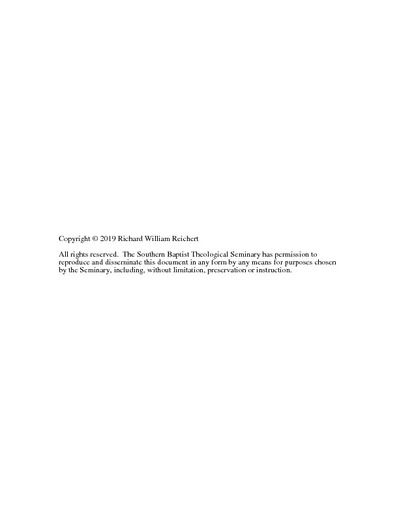The End of Humanity: A Teleological Ethic for Cognitive Enhancement Technology
Subject
Nootropic agents--Religious aspects--ChristianityHuman body and technology--Religious aspects--Christianity
Bioethics--Religious aspects--Christianity
Abstract
Human enhancement technologies are developing rapidly. One of the most popular enhancements is the illicit abuse of cognitive enhancing “smart pills” to achieve positional advantage in colleges and workplaces. Chapter 2 reviews the state of debate concerning the ethics of cognitive enhancement technology by contrasting proponents who argue enhancement technology is necessary to overcome the limitations of embodiment, against enhancement opponents concerned with the commodification of human dignity and the risk of a “new eugenics.” This dissertation offers a biblical Christocentric alternative to help guide the moral applications of human enhancement technology for the future.
Chapter 3 argues that finitude and embodiment are not deficiencies of the human condition to be overcome or enhanced by technology. Rather, the limitations of embodiment are divinely good, providing the philosophical and theological warrant for human freedom, equal dignity, and true authenticity.
Since human enhancement implies that there is a perfect human archetype to provide the direction for improvement, chapter 4 argues that fulfillment of the imago Dei ought to be the proper teleological objective for human enhancement. Because the imago Dei first created in Adam became obscured and frustrated by sin, the image of God is now given in Jesus, the perfect archetype for humanity. According to Oliver O’Donovan, true humanity is fulfilled by participating “in Christ” with His authority to redeem and reorder creation.
Chapter 5 argues that this participation is effected through the aretaic imitation of Christ’s kenotic attitudes of humility, compassion, and reverence. The applications of enhancement technology that honor these kenotic virtues and assist humans in their fulfillment as imago Dei to reorder creation are prima facie moral. Applications of enhancement technology which interfere with fulfilment of this human telos are immoral.
Chapter 6 explores the role of emotion and phronesis to guide the kenotic virtues, concluding that a precautionary principle demands a set of moral criteria to adjudicate the morality of any specific application of human enhancing technology. Chapter 7 argues that Christ’s kenotic attitudes translate into five moral criteria for determining the ethical use of human enhancement technology by healthy persons: just cause, transparency, temporality, proportionality, and reverence. The chapter closes by giving several illustrations of the application of these criteria to various real-world scenarios. Chapter 8 provides the conclusion and contrasts Christian and humanist views of the telos for humanity.

